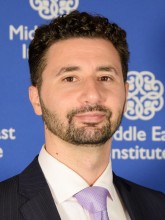In this week's Monday Briefing, MEI experts Bilal Y. Saab, Randa Slim, and Gerald Feierstein provide analysis on recent and upcoming events including Washington’s concerns about F-35 sales to Turkey, Iraq's vote recount amidst mounting violence, and the king of Jordan's visit to the White House to discuss Trump's Israeli-Palestinian peace plan.
The US’s F-35 conundrum
Bilal Y. Saab, Director of the Defense and Security Program
If Turkey does follow through with its purchase of the Russian S-400, an advanced air defense system, the Russians could acquire precious data on the U.S.’s F-35 stealth plane, which Turkey is supposed to receive, that might jeopardize its security, and in turn, the security interests of the U.S. and NATO.
This is a legitimate concern given the power competition between Russia and the U.S., but it does raise two questions: First, how would the Russians be able to collect such data on Turkish soil? Second, why can’t Turkey—and the U.S.—guard against such Russian attempts or at least minimize the risks?
If the S-400 deal does go through, Russian instructors will fly to Turkey to train the Turkish military on how to operate the sophisticated radars and fire control systems. It is through this interaction that the Russians might be able to gather sensitive data on the capabilities of the F-35.
But it’s not clear that the Russians would be able to so easily collect the data and log it into their systems.
Security countermeasures do exist, and it all depends on whether Ankara wants or is able to enforce them. Turkey can apply strict control over the nature and duration of Russian access and activities during training sessions. It could also limit the number of Russian technicians who will be briefly embedded within its military and the amount of practice sessions with Turkish forces.
Iraq’s electoral enigma
Randa Slim, Director of the Initiative for Track II Dialogues
While cleric Muqtada al-Sadr has been making steady progress forming his “big tent” governing coalition, the process of forming a new Iraqi government is facing delays due to the decision by the Supreme Federal Court to back a law passed by Iraq’s parliament to conduct a manual vote recount following fraud allegations. In addition to the vote recount, Iraq’s top court argued that nullifying the votes of Iraqis overseas and those of the internally displaced would be unjust for those who cast legitimate votes. Sunday’s decision, made by a panel of judges appointed to oversee the vote recount, to focus only on “problematic ballots” gives hope that the vote recount will not take as long as previously expected.
On Jun. 23, another political alliance was announced between Sadr’s Sairun and Prime Minister Haider al-Abadi’s Victory bloc, bringing together the three top blocs headed by Sadr, Badr militia leader Hadi al-Amiri, and Abadi, respectively. Add to the mix the alliance announced earlier between Sadr, the National Wisdom Movement headed by Ammar al-Hakim, and al-Wataniya headed by former vice president Ayad Allawi.
Among the many challenges facing the next Iraqi government is what to do with the armed militias that make up the Popular Mobilization Units (PMU). They are quickly turning into a threat to civil peace and interfering in Iraqi foreign policy. On Jun. 21, for example, members of the Iran-backed Hezbollah Bridages engaged in a shootout with Iraqi police on the streets of Baghdad, wounding three. Following a strike on Iraqi militias positioned inside Syria close to the border with Iraq, PMU leaders issued threats against the U.S.-led coalition forces in Iraq and called on the government to demand their withdrawal from the country.
An unlikely peace
Gerald Feierstein, Director of Gulf Affairs and Government Relations
Jordan’s King Abdullah arrives at the White House today for a meeting that will focus largely on the Trump administration’s Israeli-Palestinian peace plan amid reports that the plan may be nearing its completion. Abdullah met recently with Jared Kushner and Jason Greenblatt, who are continuing their meetings with Arab and Israeli leaders in the region, albeit not with the Palestinian leadership that is continuing its boycott of contacts with the U.S. team. The Jordanians are reportedly nervous that the plan, if early indications are a fair reflection, could provoke further demonstrations in Jordan.
Meanwhile, Jared Kushner gave a lengthy interview to the Palestinian al-Quds newspaper over the weekend that was advertised as an effort to appeal over the heads of the Palestinian political leadership and speak directly to the Palestinian people to build support for the as-yet unveiled plan. “Don’t let your leadership reject a plan they haven’t even seen,” Kushner said. “Don’t allow your grandfathers’ conflict to determine your children’s future.” Despite his criticism of the Palestinian leadership, however, Kushner offered Palestinians nothing new in terms of what to anticipate from the administration’s efforts. He gave no indication that the plan will address the status of Jerusalem, settlements, refugees, or borders, which all remain the key sticking points in the negotiations. Instead, he repeated vague promises of major investments and economic opportunities that largely regurgitate promises the Palestinians will have heard many times in the past. As such, it’s doubtful that the interview will affect the Palestinian political dynamic.
Photo: Atilgan Ozdil/Anadolu Agency/Getty Images





